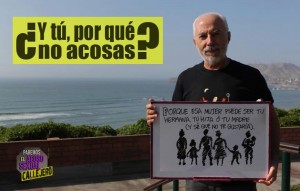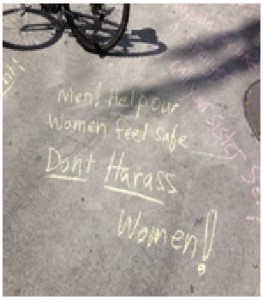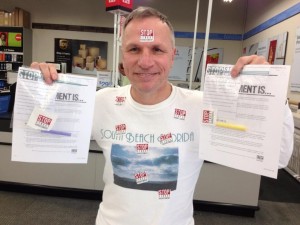Today’s International Anti-Street Harassment Week tweet chat starts in 90 minutes and will be hosted by FAAN Mail & Women’s Media Center. It focuses on the connection between the sexualization of girls/women in the media and street harassment. Follow #EndSH and #SheParty
Day 4 of #EndSHWeek: Media
 Word about International Anti-Street Harassment Week is spreading! Here are four articles from today:
Word about International Anti-Street Harassment Week is spreading! Here are four articles from today:
“The issue of street harassment is directly connected with the issue of rape culture. “Street harassment is about exerting power over someone, treating them with disrespect, and it’s often about sexually objectifying someone without their consent. The same can be said about sexual violence and rape. Street harassment is on the same spectrum of violence as rape and it can sometime escalate into rape. For rape survivors, it can be re-triggering.
“The acceptance of street harassment, the portrayal of it as a compliment or a joke, creates a culture where it is normal to disrespect someone or to comment on them or to touch them without their consent. That culture helps make rape okay and lets rapists get away with their crime.”
“Public places are less safe for women and girls worldwide; street harassment and the fear of sexual violence negatively impact our mobility and our access to public spaces. Yet too often, street harassment is dismissed as being no big deal or a compliment.
To bring attention to the harms of street harassment, Stop Street Harassment organized the second annual International Anti-Street Harassment Week. Anyone anywhere can participate by sharing stories, having dialogue –especially with men – about street harassment issues, and visibly reclaiming public spaces and engaging community members.”
“On Monday, Hollaback! Baltimore lead a Twitter chat about street harassment experienced by LGBTQ and gender-non-conforming people, pointing out that though walking with your partner usually makes you safer if you`re a straight, cisgender woman, being in public with your partner if you`re queer or trans* often increases the chances that you`ll experience harassment. You can check out a Storify recap here.
Yesterday, Men Stopping Violence led another online discussion, this time about bystander responsibility and what men can to do unlearn the culture of silence and non-engagement surrounding street harassment. Check out a recap of what happened here.
These Twitter chats will continue throughout the week, and include discussions about how the objectification of women in the media relates to street harassment, the segregation of public spaces, and street harassment experienced on public transportation. The full schedule can be found here….
Erika Nicole Kendall has a powerful editorial on her blog about her history with street harassment, young motherhood, and reclaiming her safety as a black woman.
Over at the New York Times, Ginia Bellafante reports on police harassment experienced by trans* New Yorkers on the street.
Courtney Baxter’s grassroots street photography initiative is showcasing people’s experiences being queer in public to dismantle the culture of fear surrounding harassment and homophobia in public spaces.”
“Street harassment is most commonly thought of as a problem for women, but it doesn’t confine itself to one group, said Paridise Valentino, who works for the Trans Youth Support Network.
Valentino is a transgender woman and said she and others in the lesbian, gay, bisexual and transgender community experience street harassment frequently.
When riding the bus, a man once yelled discriminatory comments about Valentino’s gender after she asked him why he was looking at her strangely.
“A lot of times when the LGBT community goes out and express themselves, it kind of brings a panic to society because they think we’re trying to rebel,” she said.
More than half of all transgender and gender non-conforming respondents reported being “verbally harassed or disrespected” in public in a 2011 National Center for Transgender Equality and National Gay and Lesbian Task Force report.
Because street harassment is common for members in the LGBT community, they’re not able to be themselves in public, Valentino said.
Katie Eichele, director of the Aurora Center for Advocacy and Education, said harassers often oppress people who are LGBT because they see them as a target to dehumanize.”
Day 3: Anti-Street Harassment Week
 We’re wrapping up Day 3 of International Anti-Street Harassment Week. The days have been packed with events, social media, articles, and story sharing. Thank you for what you’re doing!
We’re wrapping up Day 3 of International Anti-Street Harassment Week. The days have been packed with events, social media, articles, and story sharing. Thank you for what you’re doing!
Here are a few updates:
1. More events were added today. See if there’s something in your area. If not, start something! There’s still time to get a few friends together to put up flyers or write sidewalk chalk messages — most of the week’s activities will take place Saturday!
2. Photos from activities can be found in this album (aren’t they inspiring?!). If you’re hosting an event, please send me a link to your album of photos or send me photos directly. And please, do take photos! Even if you just put up a flyer on a community bulletin board, take a photo of that & send it to me!
3. Tweet Chats are going really well! Here is the Storify from the Male Ally Tweet Chat today!
4/11, join @breakthrough, @Bell_bajao & @blank_noise for a 12 hr tweetchat about #streetharassment, segregation in public spaces #EndSH
4/12, join @EverydaySexism for a convo about #streetharassment on public transportation. #endsh
4. Media Coverage is growing. Here is a list so far, including a HuffPost Live segment that happened this evening.
5. Free Webinar will be hosted by METRAC tomorrow on preventing street harassment, 12 p.m. EST. Registration info.
Taking Back the Streets in South Beach, Florida
This is a guest blog post for International Anti-Street Harassment Week, by Alan & Beckie, Florida, USA
 “Men, help women feel safe in public spaces: Don’t Harass Women”
“Men, help women feel safe in public spaces: Don’t Harass Women”
“Men, think of your mother, your grandmothers, your sisters, daughters and wife…..Don’t harass Women”
“Saying, ‘Hey Baby’ isn’t a compliment to anyone”
These are some of the many chalk messages my wife, Beckie Weinheimer and I wrote on Sunday on sidewalks in the area of Lincoln Blvd. and Washington Ave. in South Beach, FL.
Sunday was the first day of the third annual International Anti-Street Harassment Week and we decided to make kits including: a piece of chalk, a Stop Street Harassment sticker and literature about ways to address Harassers and what the movement is about.
We live in West Palm Beach, but decided to drive to South Beach because my wife has been harassed on the street many times there and the public there is generally much younger and probably more in tune with street harassment.
 We found people to be largely disinterested, focused on their vacation plans, etc. But as long as one of us was chalking, we had a steady stream of lookers and a few who wanted to engage in the dialogue.
We found people to be largely disinterested, focused on their vacation plans, etc. But as long as one of us was chalking, we had a steady stream of lookers and a few who wanted to engage in the dialogue.
Since my wife’s knees couldn’t take the kneeling and writing, I wrote from a male point of view and was happily amazed at all of the things I came up with for men.
After about an hour, we gave out many of our kits, engaged several people in dialogue and had dozens stop and read!
For those who are interested in doing something similar, here are short videos about what we did: Part 1 | Part 2 | Part 3.
Alan Kearl and Beckie Weinheimer, just moved to West Palm Beach, FL from New York City. While Beckie has often been the object of harassing comments in public spaces, she mostly just endured it, until a few years ago. Inspired by their daughter, Holly Kearl, and her Street Harassment research and activism, Beckie realized she could stand up for herself. Alan and Beckie have become increasingly organized and active in promoting safe streets and bringing attention to the horrible consequences for women of harassment in public spaces.
What Men Should Say To Women in the Street
This article is cross-posted with permission from the Brooklyn Movement Center.
“I said she looks nice today. What’s wrong with that? Why can’t she just say, ‘Thank you’?”
Yesterday, I was at Fulton Park in Bed-Stuy having a conversation with a man about street harassment, and I found myself at a conversational impasse. He said something both logically and socially acceptable that I knew in my gut was wasn’t right. Street harassment is such a normalized function of our male-dominated society that we often can’t discern why it’s just plain wrong.
Most people agree: rape is an abhorrent crime; following a woman home is creepy; grabbing a woman’s arm to make her talk to you is a gross abuse of male privilege. No man will admit to wanting to be that guy who scares and sexually violates women. Everyone condemns the actions of Sexual Violator Guy.
But what about the guy who yells out, “Why you so mad? Smile, you beautiful!,” while a woman is minding her own business? Men — even men who proclaim proudly to never harass women — find the line is a bit blurred there. Well, what’s wrong with smiling, one might say.
Nothing is wrong with smiling. Victims of street harassment are not ardent smile-haters. We are women who, like men, are just going about our lives and are not particularly interested in walking around wearing inane grins for the sake of entertaining our male neighbors and random strangers.
The problem is not that women don’t like smiling. The problem is that Smile Guy, in asking a complete stranger to give him a smile just because he wants it, feels entitled to receive it. The problem is that, sometimes, if you don’t smile, this dude may call you a bitch or spit at you or push you to the ground.
The problem is, when a man tells a woman to smile or “compliments” her “fat ass” or asks her if she likes it doggy style, she doesn’t know if he’s going to turn into the dude that threatens to rape her. Or follows her home and rings her doorbell at odd hours. Or takes off his shirt and chases her through the street. How do we women, walking at 10pm through a poorly lit and empty park, know that Smile Guy isn’t one bad interaction away from becoming Sexual Violator Guy?
A sticker you can give to street harassers, designed by Audrey Wayne.
This is where we need male allies to understand: yes, dudes yelling random things at us is annoying. Most of us are not against street harassment just because we’re annoyed. We’re against it because we’ve been followed, we’ve been raped, we’ve been killed. We’ve met Sexual Violator Guy, and that motherfucker almost always starts out as Smile Guy. Hey Sexy Guy. I Love Your Juicy Lips Guy.
So don’t turn a blind eye to gateway behavior. Don’t shrug, say it’s standard for men to pursue women and that it’s not harmful. It’s not harming you, but you can’t see a woman’s hand clenched around her keys in her pocket just in case she has to clock I’d Really Like To Ride That Ass Guy at 3am on her way home after a night out.
What can you do when you see I’d Really Like To Ride That Ass Guy tell Scared As All Get Out Woman, “Fuck you, ugly bitch” after she doesn’t respond to his advances?
Be Asked Her If She Was Okay Guy. Or even Offered to Walk Her Home Guy. We could use more of these guys holding us down instead of Walked Right Past Her ‘Cause It Wasn’t That Bad Yet Guy.
As Brooklyn Movement Center‘s Lead Community Organizer, Anthonine Pierre looks to bring people together to make Central Brooklyn a smaller (and better!) place. She’s a lifelong Brooklynite, foodie, and enthusiasm enthusiast. When she’s not working at BMC, she’s usually looking for the Wiz with her friends the Lion, the Tin Man & the Scarecrow.


